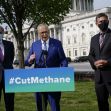As part of his determination to begin a sustained effort to safeguard the nation’s air and water, combat climate change at home and abroad, and protect endangered species, President Biden returned the U.S. to the Paris climate accord in his first moments in the Oval Office. He said, “I thought there’s no time to wait. Get to work immediately.” The executive order returning the U.S. to the Paris accord was one of three Biden signed in front of reporters.
The Paris Agreement, signed by Obama in 2015, includes nearly 200 nations in an agreement to fight climate change. The Agreement requires countries to reduce greenhouse gases, such as carbon dioxide, to target amounts they set voluntarily. Nations must accurately report their efforts. By rejoining, the U.S. has committed to once again provide funding to developing countries for their climate change efforts. Michael Gerrard, director of Columbia University’s Sabin Center for Climate Change Law said, “It’s a very strong signal to the world that President Biden is sharply reversing the Trump policies and rejoining the national effort to fight climate change. It will be warmly received by the rest of the world and put the U.S. back in a position of leadership.”
With the following words, Biden bound the U.S. to the Paris Climate Agreement: “I, Joseph R. Biden Jr., President of the United States of America, having seen and considered the Paris Agreement, done at Paris on December 12, 2015, do hereby accept the said Agreement and every article and clause thereof on behalf of the United States of America.”
Biden also ordered federal agencies to review years of environmental policies enacted by Trump and to reverse them quickly, if possible. Nearly half the directives are aimed at regulations from the EPA on issues as diverse as gas-mileage standards and drinking water.
Biden claims to tackle climate change as one of his core policies and included these words in his inaugural address: “A cry for survival comes from the planet itself. A cry that can’t be any more desperate or any more clear.” His new climate adviser, Gina McCarthy, told reporters that the administration will “begin undoing some of the harmful actions that happened in the previous administration’s watch so that we can move forward in combatting the climate crisis.”
Citing Biden’s work to mend the environment, McCarthy said he would sign “a broad executive order that takes steps that are imperative to address our climate crisis, and will also create good union jobs and advance environmental justice while reversing more than 100 of the previous administration’’s harmful policies.”
Biden further plans to sign an executive order with these aims in mind:
• Rank climate higher in domestic and national security policy
• Require federal agencies to employ ”science and evidence-based decision-making”
• Reestablish the Presidential Council of Advisors on Science and Technology
• Broadcast that U.S. data will be the foundation for the anticipated Climate Leadership Summit in April 2021.
Biden’s sense of urgency about climate change is apparent, and he is bolstering his position by placing people in his government who share his views. The regulations he is having reviewed include a Transportation Department regulation making it easier to transport liquefied natural gas by rail and a Labor Department rule that prevents environmentally sustainable mutual funds from being default retirement investments.
McCarthy said, “At this moment of profound crisis, we have the opportunity to build a more resilient, sustainable economy, one that will put the United States on an irreversible path to achieve net-zero emissions economy-wide no later than 2050.”
Patricia Espinosa, executive secretary of the U.N. Framework Convention on Climate Change, said “The United States is such an important actor internationally. So this day today has been creating a lot of expectation everywhere. Very few generations have the opportunity to really influence a historical change in the way that humanity evolves. This is one of those moments. So it means a lot to have the U.S. back.” The U.S. is the world’s second-largest producer of greenhouse gases.
Most of Biden’s initiatives will not be immediate, as they require studies and proposals. His most immediate action was to rescind the permit Trump granted the Keystone XL pipeline, which was to transport crude oil from sand pits in Alberta, Canada, to Nebraska. The American Petroleum Institute’s chief executive, Mike Sommers, said that although his members “support the ambitions of the Paris Agreement,” Biden and his administrator should remember that “models show that this agreement between nations cannot be achieved without access to natural gas.” He said, “Revoking the Keystone XL pipeline is a significant step backwards both for environmental progress and our economic recovery.”
Among Biden’s directives are that the EPA and the Transportation Department improve fuel-efficiency standards for cars and light trucks. He has also asked other departments to review boundaries and protections for national monuments off the coast of New England that Trump had reduced.
Rejoining the Paris Climate Agreement will become effective in 30 days. Biden’s plans to impose a temporary moratorium on natural gas and oil leasing activities in the Arctic National Wildlife Refuge in Alaska will take significantly longer. The problem is that last week Interior’s Bureau of Land Management signed and issued nine leases spanning 437,804 acres on the refuge’s coastal plain. The sale of those leases raised about $14 million, less than 2% of what Republicans in congress predicted when the reserve was first opened to drilling in 2017.
The leases “reflect a solid commitment by both the state and industry to pursue responsible oil and gas development on the Alaska’s North Slope,” according to BLM Alaska State Director Chad Padgett.
Biden will reestablish a group to determine the “social cost of carbon,” which will be an estimation of the specific economic damage caused by the release of a ton of carbon dioxide into the atmosphere. This figure will be used in the computation of cost-benefit analysis to be used in making policy on multiple issues, including permitting new oil wells and imposing stricter pollution controls on power plants.
For reference, Obama’s administration determined the price per ton would stand at $52 now, but Trump officials figured it would be lower, and reduced it to between $1 and $7 per ton. $125 per ton is suggested as a starting point for the Biden administration, according to some economists. They believe this rate would better reflect current research on climate change and market realities. “It is the one way you can uniformly incorporate the cost of climate change into decisions across all of government,” says Kevin Rennert, director of Social Cost of Carbon Initiative at Resources for the Future.
Though Biden’s plans and environmental directives on day one far surpass any prior president, whether he manages to push through all of his agenda will remain to be seen. Rebuilding the nation’s image in the world as a climate action leader will be a challenge.
Brandon Wu, director of policy and campaigns at ActionAid USA wrote in an email, “Rejoining the Paris agreement is only the beginning, and the incoming administration appears to know this. In order to make truly meaningful progress towards global cooperation on climate, the Biden administration must follow up with concrete actions. There’s simply no reason for other countries to trust our word if we fail, again, to act on our own emissions and use the significant resources at our disposal to support the world’s most vulnerable countries.”






